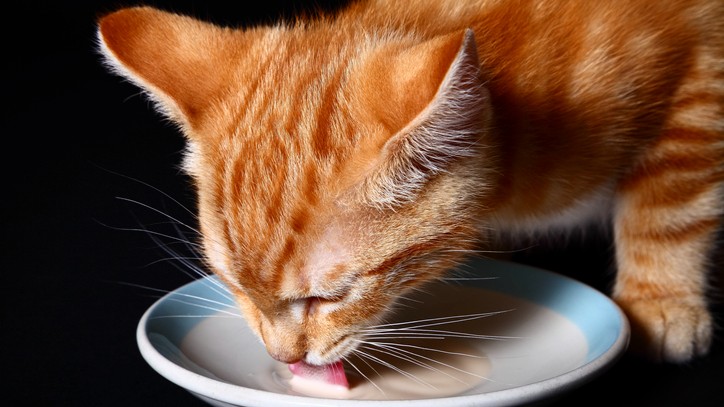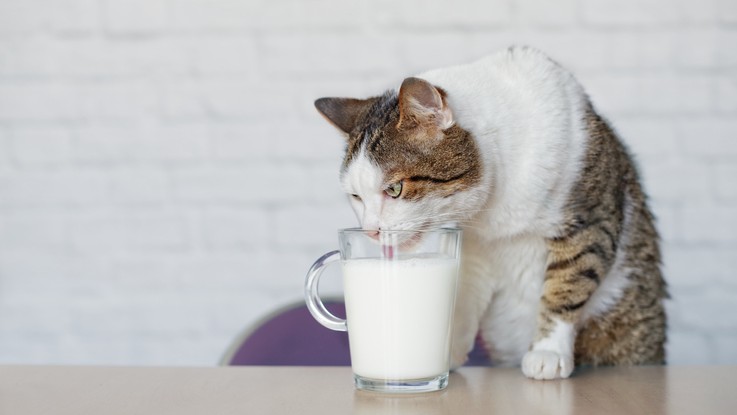Should cats drink milk?
“Feed your feline a saucer of milk” they say. “It’ll make them healthy” - but should cats drink milk? Find out in our latest article.

Get the best advice, tips and top tech for your beloved Pets
You are now subscribed
Your newsletter sign-up was successful
You’ve just brought home your new, furry feline and find yourself wondering “should cats drink milk?”
And it’s a very common question to ask!
For many years, owners have been made to believe that milk is one of best cat treats that they could give their felines - a delicious white liquid that would ensure their pet remained as healthy as can be.
However, this isn’t at all true and giving your cat milk to drink could actually be doing more harm than good, despite how much they look like they’re enjoying it.
Is milk bad for cats?
Providing that your feline is given a well-balanced, complete diet, there actually aren’t any benefits to cats drinking cow’s milk.
With that said, kittens - of course - need their mother’s milk to survive during the first few months of their lives, so milk should only be given if you are required to hand feed a kitten. And, even in this scenario, they should be given a special kitten formula until they are a few months old, which is when the weaning process is started until they can move onto solid food and water by the time they are eight to 10 weeks old.
Similar to the popular questions of can cats eat chocolate? and can cats eat eggs?, it’s important to remember that cow’s milk is (on the whole) considered to be a human food, so it’s important to know the answer to: what human food can cats eat?
Get the best advice, tips and top tech for your beloved Pets
To try to put this into perspective, a single saucer of milk for a cat is the equivalent of us eating a whole 12” inch pizza to ourselves as well as all of the other meals we eat in a day!
Are cats lactose intolerant?
The reason that cow’s milk is considered to be quite bad for cats is that their bodies are unable to process it the way that ours do.
A cat’s intestines are not capable of digesting the sugar that is found in milk, otherwise known as lactose. This is because they don’t have the enzymes, called lactase, whose job it is to break down the sugars.
This means that cats are actually lactose intolerant and, just like humans who suffer with this, if milk is consumed, can cause stomach pains, constipation, vomiting, and diarrhea.
Another reason why cow’s milk is considered to be bad for cats is because it’s full of fat so, as well as causing huge issues with their diet, it can lead to your felines becoming incredibly overweight.
Can cats drink oat milk?
Technically, yes. Cats can drink oat milk.
However, even though it won’t cause the same digestive upset to your cat as cow’s milk would, oat milk wouldn’t provide any nutritional value to your feline’s diet.
That’s why, if you really feel it’s necessary, oat milk should only be given to your cat in moderation and not in place of any meals or drinking water.
Can cats drink goat milk?
Surprisingly, goat milk can be quite beneficial to cats and can even become a healthy addition to their diet, providing that it’s given in moderation.
This is especially true for felines who naturally suffer with digestive or bowel problems as it contains a special compound that helps to reduce inflammation in the intestines.
Goat milk can also help cats who suffer with diabetes as a result of it being high in fat and low in sugar.

Can cats drink coconut milk?
Absolutely not!
Coconut milk is considered to be incredibly harmful to cats because it is so rich in oils and fats, as well as potassium.
Drinking this type of plant-based milk can cause your cat to experience stomach upset, loose stools, and diarrhea.
Can cats drink almond milk?
Since almond milk does not contain dairy, cats are technically able to drink it.
However, almond milk for cats is considered to be extra and, quite frankly, unnecessary calories.
To put this into perspective, a cup of almond milk will contain roughly 100 calories. However, healthy cats, which weigh 10 pounds on average, only need to take in 200 calories from their food and drink per day.
Also, some almond milks are sold as sweetened, meaning that extra sugar has been added to the drink, which increases a cat’s risk of becoming obese as well as developing tooth decay.
What do cats drink?
What should cats drink? Now that you’ve discovered which types of milk are safe for cats to consume, even if they may not be particularly beneficial when it comes to their nutritional content, it’s important to discuss what cats should be drinking above all else.
Just like dogs, the only fluid that cats (on the whole) need to survive is water.
Providing your feline with fresh, clean water is a sure way to keep them both happy and hydrated.
Should you ever be concerned that your cat isn’t drinking enough, consider placing a number of water bowls or even a pet water fountain around the house - you might find that they have a preferred place that they like to drink.
Read next: How to make soup for cats
Chloe is a freelance writer, editor, and proofreader, who has more than ten years’ experience in creating animal-focussed content. From National Geographic to Animal Planet, Chloe’s passion for creating fact-filled features all about wildlife and the environment is evident. But it’s not just wild animals that Chloe’s fascinated by. Having written more than 75 articles for PetsRadar - and having her very own four-legged friend by her side - it’s no wonder that her love of dogs (and, of course, cats) has grown exponentially.
Her website, www.chloemaywrites.com, and social media pages - @ChloeMayWrites on Instagram, Facebook, and Twitter - showcase her knowledge through daily facts and trivia tidbits. For example, did you know that snails have teeth?!

